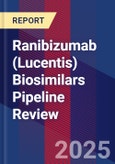This product provides basic information on approved drugs and drug candidates in research and development as biosimilar antibodies of Lucentis (ranibizumab).
Lucentis (ranibizumab injection) is a recombinant humanized IgG1 kappa isotype monoclonal antibody fragment (Fab) designed for intraocular use. Ranibizumab binds to and inhibits the biologic activity of human vascular endothelial growth factor A (VEGF-A). Ranibizumab, which lacks an Fc region, has a molecular weight of approximately 48 kilodaltons and is produced by an E. coli expression system in a nutrient medium containing the antibiotic tetracycline. Tetracycline is not detectable in the final product.
Lucentis is FDA-approved for the treatment of patients with wet age-related macular degeneration (AMD), macular edema following retinal vein occlusion (RVO), diabetic macular edema (DME), diabetic retinopathy (DR) and myopic choroidal neovascularization (mCNV).
Lucentis was developed by Genentech, a member of the Roche Group. The company retains commercial rights in the United States and Novartis has exclusive commercial rights for the rest of the world.
Outside the United States, Lucentis is approved in more than 120 countries to treat adult patients with wet AMD, for the treatment of visual impairment due to DME, due to macular edema secondary to both branch retinal vein occlusion (BRVO), central retinal vein occlusion (CRVO) and due to choroidal neovascularization (CNV).
Biosimilars are follow-on versions of biopharmaceuticals, for which exclusivity has expired. They are approved via stringent regulatory pathways in highly regulated markets (such as EU, US, Japan, Canada, Australia) based on proven similarity of the biosimilar with the originator biopharmaceutical reference product. The first Lucentis biosimilar products have been launched in the US, Europe, Japan and other territories.
This product consists of:
- Competitors described in a tabular format covering drug code/INN, target(s)/MoA, class of compound, territory of main competitor, indication(s) & R&D stage.
- Project History with link to source of information (press release, homepage, abstracts, presentations, annual reports etc).
- One-month online access to the publisher’s database for TSLP inhibitors (prerequisite: access to internet).
Lucentis (ranibizumab injection) is a recombinant humanized IgG1 kappa isotype monoclonal antibody fragment (Fab) designed for intraocular use. Ranibizumab binds to and inhibits the biologic activity of human vascular endothelial growth factor A (VEGF-A). Ranibizumab, which lacks an Fc region, has a molecular weight of approximately 48 kilodaltons and is produced by an E. coli expression system in a nutrient medium containing the antibiotic tetracycline. Tetracycline is not detectable in the final product.
Lucentis is FDA-approved for the treatment of patients with wet age-related macular degeneration (AMD), macular edema following retinal vein occlusion (RVO), diabetic macular edema (DME), diabetic retinopathy (DR) and myopic choroidal neovascularization (mCNV).
Lucentis was developed by Genentech, a member of the Roche Group. The company retains commercial rights in the United States and Novartis has exclusive commercial rights for the rest of the world.
Outside the United States, Lucentis is approved in more than 120 countries to treat adult patients with wet AMD, for the treatment of visual impairment due to DME, due to macular edema secondary to both branch retinal vein occlusion (BRVO), central retinal vein occlusion (CRVO) and due to choroidal neovascularization (CNV).
Biosimilars are follow-on versions of biopharmaceuticals, for which exclusivity has expired. They are approved via stringent regulatory pathways in highly regulated markets (such as EU, US, Japan, Canada, Australia) based on proven similarity of the biosimilar with the originator biopharmaceutical reference product. The first Lucentis biosimilar products have been launched in the US, Europe, Japan and other territories.








